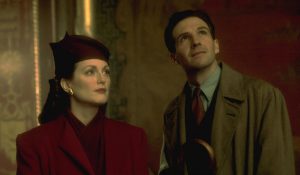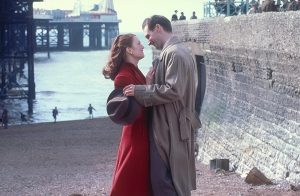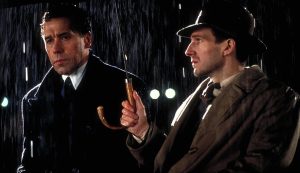The End of the Affair (1999) is a deeply emotional and thought-provoking romantic drama, directed by Neil Jordan and based on Graham Greene’s literary masterpiece of the same name. With a stellar cast including Ralph Fiennes, Julianne Moore, and Stephen Rea, the film delves into the complexities of love, loss, betrayal, and faith, set amidst the turmoil of wartime London.
Plot Overview
The story revolves around Maurice Bendrix (Ralph Fiennes), a novelist consumed by bitterness and obsession after his intense affair with Sarah Miles (Julianne Moore) abruptly ends. When circumstances lead him to reconnect with Sarah and her husband, Henry (Stephen Rea), Maurice embarks on a quest to uncover the truth behind Sarah’s decision to leave him. The narrative masterfully shifts between past and present, unraveling secrets that challenge perceptions of love and the divine.
Performances
Ralph Fiennes delivers a powerful performance as Maurice, capturing the character’s inner torment and passion. Julianne Moore is captivating as Sarah, skillfully portraying her emotional complexity and moral conflict. Her performance earned her an Academy Award nomination. Stephen Rea brings a quiet poignancy to his role as Henry, adding depth to the story’s triangle of love and pain. The chemistry among the three leads enhances the film’s emotional impact.

Cinematic Elements
Neil Jordan’s direction blends sensuality with introspection, creating a film that is both visually striking and emotionally resonant. Roger Pratt’s cinematography captures the moodiness of wartime London, complementing the story’s somber tone. Michael Nyman’s haunting score underscores the narrative’s themes of longing and despair, enhancing the film’s dramatic weight.

Themes and Impact
The film explores profound themes of love, faith, and redemption, probing the moral and spiritual dilemmas that define the characters’ lives. It raises questions about the nature of divine intervention and the sacrifices people make for love. The story’s blend of romance and existential inquiry resonates deeply, making it a memorable and moving adaptation of Greene’s novel.

Flaws
Some viewers might find the film’s pacing slow, and its heavy focus on philosophical and religious themes may not appeal to all audiences. The nonlinear structure demands close attention, which could be challenging for casual viewers.
Conclusion
Overall, The End of the Affair (1999) is a richly layered and beautifully crafted film that captures the heartache and complexity of Greene’s story. With outstanding performances and evocative cinematography, it offers an intimate yet profound cinematic experience.

